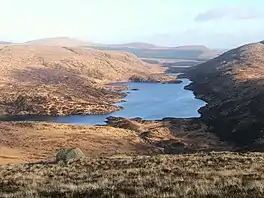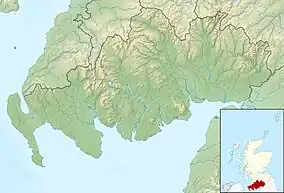Loch Valley
Loch Valley is a loch in Galloway Forest Park to the east of Buchan Hill, north of the Rig of the Jarkness and southwest of Craignaw. It drains via Gairland Burn down to Loch Trool.
| Loch Valley | |
|---|---|
 The loch viewed from Buchan Hill, looking east. Loch Narroch is visible at the far end. | |
 Loch Valley | |
| Location | Galloway, Scotland |
| Coordinates | 55°06′15″N 4°26′20″W |
| Type | freshwater loch |
| Primary inflows | Mid Burn, Loch Narroch |
| Primary outflows | Gairland Burn |
| Basin countries | United Kingdom |
| Surface area | 37.2 ha (92 acres)[1] |
| Surface elevation | ~320 m (1,050 ft) |
| References | [1] |
The loch has a catchment area entirely on the Loch Doon granite, is oligotrophic,[1] and has suffered from gradual acidification since the mid-19th century[2] leading to the elimination of the original Brown Trout population.[3] It has recovered to some extent, with the pH increasing slowly from around 4.4 in 1978 to 5.2 in 2003.[4]
Between 1983 and 2003 the loch's dissolved organic carbon levels increased,[5] and the loch had a sediment accumulation rate of around 0.01 g cm−2 yr−1 from 1850 to 1975.[6]
Water Analysis
| Element | Concentration μg/l |
|---|---|
| CaCO3 | -100 |
| Li | 0.352 |
| Al | 130 |
| V | 0.263 |
| Cr | 0.199 |
| Fe | 45.9 |
| Fe DRC | 43.9 |
| Mn | 11.0 |
| Co | 0.063 |
| Ni | 0.852 |
| Cu | 0.209 |
| Zn | 3.43 |
| As | 0.226 |
| Se | 0.198 |
References
- MA Palmer & DB Roy (April 2001). "An estimate of the extent of dystrophic, oligotrophic, mesotrophic and eutrophic standing fresh water in Great Britain" (PDF). Joint Nature Conservation Committee. Retrieved 28 June 2008.
- Richard W. Battarbee (November 1989). "The Acidification of Scottish Lochs". The Geographical Journal. The Geographical Journal, Vol. 155, No. 3. 155 (3): 353–360. doi:10.2307/635210. JSTOR 635210.
- P S Maitland (2004). "Evaluating the ecological and conservation status of freshwater fish communities in the United Kingdom" (PDF). Scottish Natural Heritage Commissioned Report No. 001. Scottish National Heritage. p. 35. Archived from the original (PDF) on 24 October 2007. Retrieved 28 June 2008.
- "Recovery from Acid Rain Gives Hope to Scottish Upland Salmonid Populations" (PDF). Fisheries Research Services. 16 August 2004. Retrieved 25 June 2008.
- "Freshwater Environment Group" (PDF). Fisheries Research Services. Retrieved 28 June 2008.
- Neil Rose & David Morley (February 2006). "Sediment accumulation rate changes in European lakes: A first report" (PDF). Integrated Project to evaluate the Impacts of Global Change on European Freshwater Ecosystems. Environmental Change Research Centre, University College London. Archived from the original (PDF) on 10 November 2009. Retrieved 28 June 2008.
- Craig D Robinson; Sylvie Charles; Iain A Malcolm; Sandhya Devalla (May 2007). "FRS METHOD FOR THE DETERMINATION OF TRACE METALS (INCLUDING RARE EARTH ELEMENTS) IN FRESHWATER SAMPLES BY INDUCTIVELY COUPLED PLASMA MASS SPECTROMETRY" (PDF). Fisheries Research Services. Retrieved 28 June 2008.
This article is issued from Wikipedia. The text is licensed under Creative Commons - Attribution - Sharealike. Additional terms may apply for the media files.